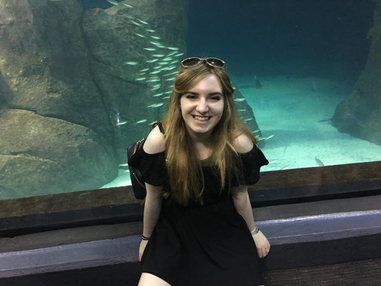Excellence in Writing Arts Medallion Winner:
Sara Skipp
by Alexander Geffard
Every spring semester, an undergraduate senior in Writing Arts is awarded the Excellence in Writing Arts Medallion. This senior is chosen based on his or her outstanding course performance, strong leadership skills, and excellent course career potential as a writer and/or as a professor of writing.
This year, that senior is Sara Skipp. She is a standout student in the Writing Arts major—one who is among the very best.
But don’t let that high honor fool you into thinking that she’s full of hubris—Sara is just the opposite.
She’s hard-working, kind, approachable, and very down to earth. Upon learning of her award from Professor Jennifer Courtney—the chair of the Writing Arts department—Sara’s genuine elation couldn’t be mistaken:
“I am so honored and absolutely elated to hear this news!! Thank you so much—I am so excited! I have had an amazing four years with the Writing Arts department, and I am overjoyed to hear that I have received this Medallion Award from the professors and faculty I admire so much. Words cannot express my gratitude!”
In her first three years as a Writing Arts major, Sara dedicated a lot of time to academic and creative writing. This year, she chose to become a different kind of writer, exposing herself to new rhetorical situations by pursuing a Fundamental Computing Certificate of Undergraduate Study and adding technical writing classes to her schedule.
She chose the Writing Arts department’s Technical and Professional Writing concentration as she was interested in the technological aspects of the field—the parts about computers and software, a common assumption of the concentration’s focus. However, she quickly learned the concentration also focuses on writing in factual,creative ways for more varied purposes.
“When I started the class one of the first things we did was talk about how Technical Writing appears everywhere,” she said. “It’s everything from instructions you see on a fire extinguisher, to medical brochures,s, to programming textbooks. And it’s amazing, it’s very audience-centric and not only about the widespread definition of technology...”
Currently, Sara is also enrolled in Scientific Writing and Rhetoric. Her goal is to communicate scientific information to a variety of audiences through research papers, feature articles and more. Sara is studying better ways of achieving sustainable farming for an ever-growing population. She is currently looking into alternatives to traditional farming such as biological seed modification, and the widespread implementation of aquaponics and hydroponics.
Sara is also enrolled in Tutoring Writing, a subject she took an interest in after visiting the Writing Center seeking advice on her senior portfolio project. She originally thought tutoring was about focusing on copy editing—fixing grammar and punctuation in a writing. But tutoring is more about working on the thesis and the construction.
“Tutoring prioritizes big picture ideas and helping students learn, through conversation, how to improve their work and become more confident analysts,” she says.
The class is about learning to have such conversations and how to help and encourage students to feel better about their writing.
Portfolio Seminar was also very important to Sara.
“Rather than take the cumulative, ‘here’s all the work that I’ve done and my analysis about my growth as a writer’ approach, I chose to work on a narrative piece—the beginning of a book. That was really important to me because I wanted to carry something new with me into the world from graduation, something that could maybe go other places.”
She wanted to be in the shoes of an author. Since then, she elected to continue writing the novel, and now, as she’s leaving Rowan, it’s completed. She’s currently on her third round of edits, and is motivated to find an agent and work with a big name publishing company.
On her way out, she’s also bringing all of her technical skills and rhetorical analysis skills—accumulating all the knowledge she can. It’s part of the reason why she selected Technical Writing and Scientific Writing and Rhetoric. Through the novel and creative writing, she learned about the social power of written communication; through Technical and Professional Writing, she learned how to ethically convey accessible information to a specific audience, rhetorically adapting to different situations through all forms of expression.
“I’m not taking them [the classes] for the sake of my resume,” Sara says. “They are useful to me on a personal level. It makes me feel empowered to have these adaptable rhetorical identities and communication skills.

